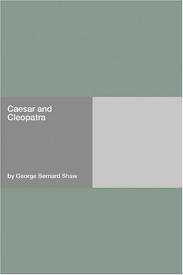What do you think?
Rate this book


114 pages, Paperback
First published January 1, 1898
CAESAR. What has happened to Pothinus? I set him free, here, not half an hour ago. Did they not pass him out?
LUCIUS. Ay, through the gallery arch sixty feet above ground, with three inches of steel in his ribs. He is as dead as Pompey. We are quits now, as to killing—you and I.
CAESAR. (shocked). Assassinated!—our prisoner, our guest! (He turns reproachfully on Rufio) Rufio—
RUFIO (emphatically—anticipating the question). Whoever did it was a wise man and a friend of yours (Cleopatra is qreatly emboldened); but none of US had a hand in it. So it is no use to frown at me. (Caesar turns and looks at Cleopatra.)
CLEOPATRA (violently—rising). He was slain by order of the Queen of Egypt. I am not Julius Caesar the dreamer, who allows every slave to insult him. Rufio has said I did well: now the others shall judge me too. (She turns to the others.) This Pothinus sought to make me conspire with him to betray Caesar to Achillas and Ptolemy. I refused; and he cursed me and came privily to Caesar to accuse me of his own treachery. I caught him in the act; and he insulted me—ME, the Queen! To my face. Caesar would not revenge me: he spoke him fair and set him free. Was I right to avenge myself? Speak, Lucius.
LUCIUS. I do not gainsay it. But you will get little thanks from Caesar for it...
CLEOPATRA (passionately). I will be judged by your very slave, Caesar. Britannus: speak. Was I wrong?
BRITANNUS. Were treachery, falsehood, and disloyalty left unpunished, society must become like an arena full of wild beasts, tearing one another to pieces. Caesar is in the wrong.
CAESAR (with quiet bitterness). And so the verdict is against me, it seems.
CLEOPATRA (vehemently). Listen to me, Caesar. If one man in all Alexandria can be found to say that I did wrong, I swear to have myself crucified on the door of the palace by my own slaves.
CAESAR. If one man in all the world can be found, now or forever, to know that you did wrong, that man will have either to conquer the world as I have, or be crucified by it. (The uproar in the streets again reaches them.) Do you hear? These knockers at your gate are also believers in vengeance and in stabbing. You have slain their leader: it is right that they shall slay you. If you doubt it, ask your four counselors here. And then in the name of that RIGHT (He emphasizes the word with great scorn.) shall I not slay them for murdering their Queen, and be slain in my turn by their countrymen as the invader of their fatherland? Can Rome do less then than slay these slayers too, to show the world how Rome avenges her sons and her honor? And so, to the end of history, murder shall breed murder, always in the name of right and honor and peace, until the gods are tired of blood and create a race that can understand.
ثيودوتس : إن مكتبة الإسكندرية تحترق
قيصر : أهذا كل شئ !؟
ثيودوتس : (كل شئ؟!)!! .. أتقول عنك الأجيال المقبلة يا قيصر أنك كنت جنديا متبربرا يجهل قيمة الكتب !؟
قيصر : يا ثيودوتس أنا نفسي مؤلفا و اقول لك أنه لمن الأفضل للمصريين أن يحيوا حياتهم بدلا من أن يضيعوها في الأحلام بفضل الكتب
ثيودوتس : قيصر ان العالم يكسب كتابا خالدا كل عشرة أجيال من الرجال
قيصر : و قد يعدم هذا الكتاب اذا لم يتملق البشرية
ثيودوتس : لولا التاريخ لسوى الموت بينك و بين أحقر جندي
قيصر : سيفعل الموت هذا على أي حال ، أنا لا أطلب مقبرة أفخم من مقبرة جندي
ثيودوتس : ان الذي يحترق هناك هو ذاكرة البشرية
قيصر : ذاكرة مخزية دعها تحترق
ثيودوتس : تحرق الماضي!؟
قيصر : نعم و أبني المستقبل بأنقاضه
POTHINUS. [astonished.] Natural! Then you do not resent. treachery?I doubt the historical Julius Caesar ever said anything like the above. Perhaps he may have thought the Egyptians were foolish, but I bet he resented treachery.
CAESAR. Resent! O thou foolish Egyptian, what have I to do with resentment? Do I resent the wind when it chills me. or the night when it makes me stumble in the darkness? Shall I resent youth when it turns from age, and ambition when it turns from servitude? To tell me such a story as this is but to tell me that the sun will rise tomorrow.